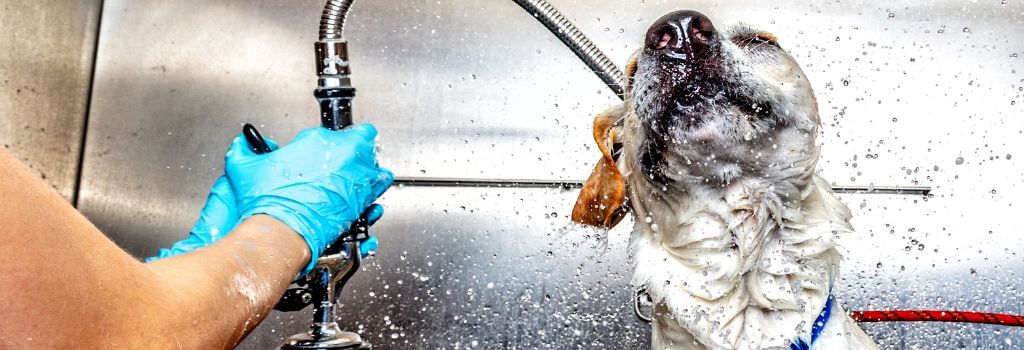As a veterinarian, I've seen countless distressed dog owners struggling with their pets' concerning skin issues. One of the most common problems are Hot spots. These painful, irritating patches can appear out of nowhere, causing significant discomfort for our dogs. Did you know that 15% of all dogs will experience hot spots at some point in their lives?
If your pup has ever had a hot spot, you know how quickly they can spread and how miserable they can make your canine feel. But what exactly are hot spots, and how can you prevent and treat them? Let’s dive into the details and get you the information you need to keep your furry friend comfortable and healthy.
What Are Hot Spots?
If you own a dog, you've probably heard of the term "hot spot." A hot spot, also known as acute moist dermatitis or pyotraumatic dermatitis, is a localized area of inflamed, infected skin. These red, oozing, and often painful lesions can appear suddenly and spread quickly, so getting your pup into the veterinarian as soon as you see any irritation is important!
Hot spots can appear anywhere on a dog's body but are commonly found in areas where moisture is likely to be trapped or where dogs can easily reach to lick or bite. The most common locations are the head, neck, chest, hips, and tail base, where moisture can get trapped and bacteria can thrive.
Hot spots can affect any dog, but certain breeds and types are more susceptible due to their coat type, skin sensitivity, or allergies. Breeds with thick, dense coats, like Golden Retrievers, German Shepherds, and Labradors, are at higher risk because their fur can trap moisture and bacteria against the skin. Dogs with underlying skin conditions or allergies, such as Bulldogs and Pugs, are also more prone to developing hot spots.
Hot weather can contribute to the development of hot spots in dogs, too. Warmer temperatures often increase humidity and moisture, which can get trapped in a dog's coat. This creates an ideal environment for bacteria to grow, especially if the dog is prone to skin issues, has a thick coat, or frequently licks or scratches certain areas. Also, dogs are more likely to swim or get wet in hot weather, which can also increase the risk of hot spots if their skin doesn't dry properly.
Regular grooming, proper hygiene, and addressing any underlying health issues can help manage the risk for these susceptible breeds. Be sure to talk to your veterinarian about proper coat management for your specific dog.

Causes of Hot Spots
Dogs can develop hot spots for several reasons, often stemming from their natural behaviors or environmental factors. Five common causes are:
- Allergies: Dogs with allergies to food, pollen, or fleas are more susceptible to hot spots. Allergic reactions cause intense itching, leading dogs to scratch and bite their skin excessively.
- Fleas and Parasites: Flea bites can trigger severe itching and irritation, prompting dogs to bite and scratch the affected area, resulting in hot spots.
- Poor Grooming: Dogs with long or dense coats, particularly those not groomed regularly, can develop hot spots from matted fur trapping moisture and bacteria against the skin.
- Skin Infections: Bacterial or fungal infections can irritate the skin, leading to the development of hot spots.
- Underlying Health Issues: Conditions like hip dysplasia or anal gland problems can cause dogs to lick or chew the painful area, resulting in hot spots.
Preventing Hot Spots on Your Dog
Preventing hot spots involves a combination of good hygiene, regular grooming, and addressing any underlying health issues:
- Regular Grooming: Brush your dog's coat regularly to keep it clean and free of mats, especially for long-haired breeds. Regular baths can also help maintain healthy skin.
- Flea Control: Use veterinarian-recommended flea prevention products to protect your dog from parasites.
- Balanced Diet: Provide your dog with a well-balanced diet to support overall skin health. Talk to your veterinarian about adding supplements like omega-3 fatty acids, which promote healthy skin and coat.
- Manage Allergies: If your dog has known allergies, work with your veterinarian to manage them effectively. This may include dietary changes or medications to reduce itching and inflammation.
- Regular Vet Visits: Routine check-ups can help identify and address potential health issues before they become severe.
- Completely Dry Your Dog: Moisture trapped in your dog's fur can create an ideal environment for bacteria to thrive, leading to skin irritation and the development of hot spots. After bathing, swimming, or exposure to rain, make sure to thoroughly dry your dog, especially if they have a thick or dense coat. Pay extra attention to areas where moisture is more likely to get trapped, such as the neck, underarms, and the base of the tail!

Treating Your Dog’s Hot Spots
Despite your best efforts, unfortunately, hot spots can still develop on your dog. When they do, quick treatment is imperative to avoid further complications.
Your veterinarian will typically start by trimming the fur around the affected area, allowing the skin to dry and making it easier to treat. They clean the wound with a mild antiseptic solution to prevent infection. Depending on the severity of the hot spot, your vet might prescribe antibiotics to combat infection and anti-inflammatory medications to alleviate swelling and pain. Topical treatments like hydrocortisone sprays are also commonly used to soothe the irritated skin. To prevent your dog from licking or biting the hot spot while it heals, an Elizabethan collar (E-collar) may be recommended.
Remember, it's best to address any underlying causes contributing to the hot spots. This could involve managing allergies, treating for parasites, or resolving other health issues. By tackling these root causes, you can help prevent future hot spots and allow your dog's skin to remain healthy.
Stopping the Hot Spots
Hot spots can be a frustrating and painful experience for both you and your dog, but with the right knowledge and proactive care, they can be effectively managed and even prevented! By understanding the causes, implementing preventive measures, and obtaining prompt veterinary care when necessary, you can help keep your dog’s skin healthy and free from these irritating issues.
Here’s to many hot spot-free days ahead for you and your canine companion!
If you have questions and you'd like to reach out to us, you can call us directly at (941) 253-5218, or you can email us at staff@uacvet.com. Don't forget to follow us on social media Facebook, Instagram.
